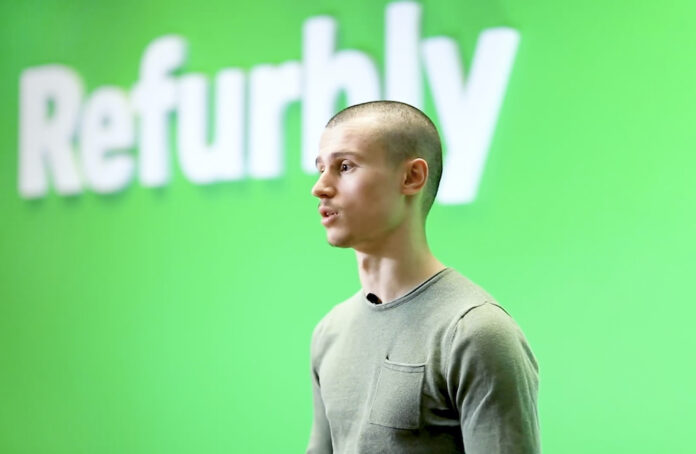
CEO David Lundgren Fetah has hit a green seam
Swedish virtual network operator Refurbly achieved 300% growth last year by giving subscribers used phones with cheap data plans and ‘circular phone insurance’. Refurbly, has grown organically since 22 year CEO David Lundgren Fetah started repairing phones and bundling them up with a subscription and a continuity insurance policy. Users not only got a cheap handset, they got a better deal on data and the blessing of Greta Thunberg.
Since then the simple honest plan of offering cheap handsets, cheap subscriptions and guilt free ownership has helped the company grow, acquiring customers and staff by reputation. In 2021 the word-of-mouth network reached former Telia Company CEO and GSMA board member Johan Dennelind, whose reputation has helped attract inward investment. “I’m excited to be part of the Refurbly team and to work alongside such a talented young entrepreneur as David,” said Dennelind. “Refurbly’s unique approach to the telecom industry is refreshing, and I believe it has the potential to make a real impact on the market.” In 2022 the revenue for the 12-person enterprise reached €1.4 million.
Tiny though that revenue may be, the success of Refurbly represents a long-term trend that big brand mobile network operators will be powerless to tap into. The beauty of Refurbly is that it’s both the telco and the repairer. Established MNOs can’t do that because of the logistical challenges involved, not least the cannibalisation of existing brands they are in hock to, such as Apple, Google and Samsung. “We saw a gap in the market where MNOs are struggling to pivot into the market for refurbished and used phones,” said Lundgren Fetah. “We noticed customers purchased their used phones from one place, and then had to get a SIM-only deal from a different place. Why not have everything under one roof, and include circular insurance, repair service and everything else?”
Refurbly became the greenest telco in the circular economy. “Everyone should have access to affordable, high-quality mobile services,” said Lundgren Fetah. “Our circular insurance model helps reduce electronic waste and our used phone offerings allow customers to save money without sacrificing quality. Last year’s growth has been incredible. Now we set our sights on new goals.”
Ultimately, the big three or four MNOs in most countries will struggle to get into the circular economy however. “There are bonuses connected to sales of new phones that manufacturers give to MNOs per sold device. The same is not true for used phones. I believe MNOs have good intentions for the environment but often their hands are tied due to their tight relationship with handset manufacturers,” said Lundgren Fetah. “We realized that MNOs in the Nordics outsource all of their device buyback to other companies. This will be a challenge long term as it is essential to have full control of your device flows if you want to succeed in the used phones market.”
Meanwhile, the impetus is with Refurbly as the circular economy is set to gear up. According to Gartner resarch, 51% of supply chain professionals expect the emphasis on the circular economy to increase in the two years. Oddly, when it comes to sustainability, old people may be the future. Lundgren Fetah, 25, agrees that older people may be more keen on refurbing and keeping their phones alive for ever. “I would say so, yes. I believe people between ages 20 to 30 are far behind on the curve when it comes to refurbished devices. Even though young people are usually eco-friendly, they tend to buy newer devices as it can be regarded as a status symbol to have the newest phone,” said Lundgren Fetah.
A child’s first phone is a strong target audience, as well as eco-friendly consumers. “Phone repair is an increasing market and we are planning on opening several repair store locations to offer omni-channel support,” said Lundgren Fetah. Has Greta Thunberg got an account? “Not yet!”


